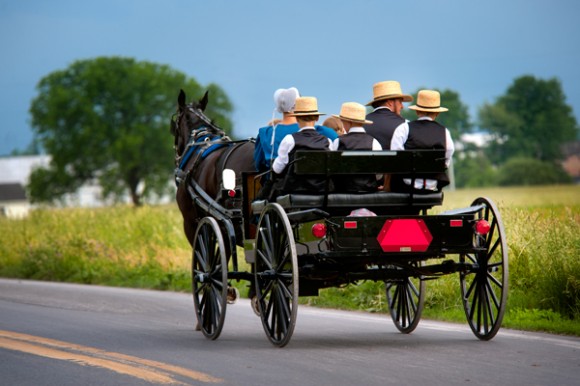I’ve lived among the Amish community all my life and even my grandparents could speak their language, Pennsylvania Dutch. Amish are a group of families that live a primitive lifestyle without today’s technology, plumbing, electricity, and vehicles. In today’s world, they are forced to get to places and design their homes to suit everyone such as installing plumbing and wiring but not hooking it up so that if they were to sell their home it could be available to anyone. There are many misconceptions that are made when one sees them in a car being driven to the store. Amish are permitted to use technology; they just aren’t allowed to possess them. In my observations of Amish over the years, I noticed how well their ways tie into power and influence.
Power is simply the ability to impact what others do and influence are the tools that are exercised to inflict change in one’s conduct, faith, outlook, and values (PSU WC L.7). One of the most important things in the Amish community is their family. A large family is believed to be a blessing from God. Their Lord and Savior is both the power and influence in which Amish live their lives. Inspirational appeals is probably the most common influence tactic from the church in that Amish are bound to the word of God. The inspirational appeals are one of the many tools of influence but this particular tool is used to spark emotional motivation to move toward an idea (PSU WC L.7). For example, an announcement might be made in church or volunteers to help their neighbor build a new barn that had burned down. One of the passages in the Bible reads, “Love thy neighbor” which signifies their duty to comply to their faith (Official King James Bible Online: Authorized King James Version, n.d).
Amish also have power among the ranks within a family. The elders possess the highest level of power as it is their expectation to respect them and listen to their teachings as they display expert power which is the knowledge and full understanding of their way of life (PSU WC L.7). According to the PSU WC lesson commentary (2014, p.7), legitimizing tactics of influence would fit best as the elders hold a position of authority. Since there are no formal schools beyond 8th grade, Amish look to their God and elders for advice, assistance, and information.
Amish parents have referent power over their children. According to the PSU WC lesson commentary (2014, p.5), referent power is the relationship between the leader and follower. Amish children look up to their parents and strive to be like them when they become adults. There is one time during adolescence where Amish youth are granted “rumspringa” which allows the children to sow their wild oats. The power is handed over to the young from the parents and they are cut loose to see the world and try modern things. Rumspringa comes to a close with the children tasked with making a choice to be baptized and wed or leave the Amish community–never to return. I feel that this is a pressure tactic in hope that the parents will get to live out the rest of their days with their family intact. The pressure tactic is another influence tool that intimidates Amish youth to stay at home rather than cast aside (PSU WC L.7).
The Amish community is a unique and demanding life style full of hard work and strict rules. Aside from this, each individual has protection, love, and trust until they choose to leave the clan. It’s hard to believe that some Amish children have the motivation and desire to leave behind their entire life and start over. On the other hand, the power of those that do depart is phenomenal.
References
Official King James Bible Online: Authorized King James Version (KJV). (n.d.). Retrieved June 13, 2014, from http://www.kingjamesbibleonline.org/
Pennsylvania State University World Campus (2014). Lesson 7: Power and Influence. PSYCH 485: Leadership in Work Settings. Retrieved from:https://courses.worldcampus.psu.edu/su14/psych485/001/content/07_lesson/11_page.html


I appreciated your example of the Amish lifestyle. Although the Amish does give their children a chance to experience “rumspringa” as a chance to experience life outside the Amish community, the power that the parents use could be considered coercive power. The Power and Influence commentary defined coercive power as a threat. If the Amish children do not return to the community after experiencing “rumspringa,” the children are shunned by the whole community including their family members. Strong connections to family members and the community could be considered essential to one person’s growth into adulthood and into leadership roles in the world.
Here is a clip from one of my favorite movies “Witness” with Harrison Ford which exemplifies the teamwork and leadership theories in real-life situations including the Leader-Member Exchange theory (LMX) in the Amish community.
https://www.youtube.com/watch?v=hCXCeV5RbHg
Pennsylvania State University World Campus (2014). Lesson 7: Power and Influence. PSYCH 485: Leadership in Work Settings. Retrieved from: //courses.worldcampus.psu.edu/su14/psych485/001/content/07_lesson/11_page.html
Pennsylvania State University World Campus (2014). Lesson 8: Leader-Member Exchange Theory. PSYCH 485: Leadership in Work Settings. Retrieved from https://courses.worldcampus.psu.edu/su14/psych485/001/content/08_lesson/printlesson.html
Youtube. “Witness.” Retrieved from: https://www.youtube.com/watch?v=hCXCeV5RbHg,